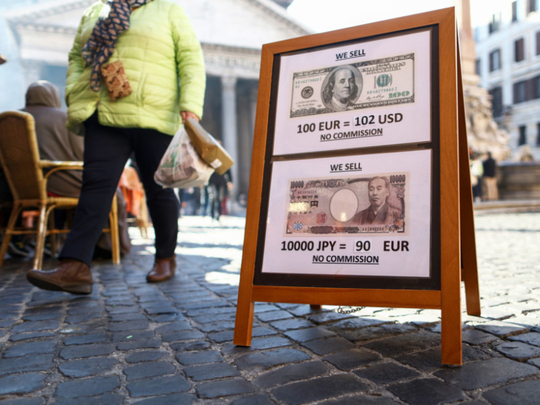
London: The euro rebounded from an initial move down, while stocks in Europe and the US advanced as investors looked past political turmoil in Italy. Treasuries slid with gold as the rotation into riskier assets continued.
The common European currency rose against the dollar even as Italy slid into political limbo after Italian Prime Minister Matteo Renzi’s resignation opened the door to fresh elections. The euro earlier fell to its weakest in 20 months. European shares headed for the biggest gain three weeks, while the cost of insuring Italian bank bonds against default jumped. Gold headed for the lowest close since February, Treasury 10-year yields rose to 2.42 per cent and a gauge of equity-market volatility slid.
Political risk from Italy hasn’t spread beyond its borders as markets were correctly positioned for the anti-establishment mood sweeping around the world. This was a departure from the Brexit referendum and Donald Trump’s surprise election, when traders were caught out by populist votes.
“After Brexit, it took three days for markets to shake it off, with Trump it took three hours, with Italy it took three minutes,” said Guillermo Hernandez Sampere, head of trading at MPPM EK in Eppstein, Germany. His firm oversees $260 million. “The outcome was not as much of a surprise as many expected it to be — markets learned their lesson.”
Italian lenders Banca Popolare di Milano Scarl and UniCredit SpA both slid at least 5.6 per cent as the outcome of the referendum raised questions about the nation’s plans to plug holes in the banking sector. Renzi’s reforms were aimed at simplifying the legislative process in a nation that’s seen 63 governments since the end of Second World War.
Negative market sentiment on the vote is likely to be mitigated by the fact that the market has been expecting a ‘No’ (vote) and that the ECB remains in play in European sovereign bond markets.” The euro hit a 20-month low of $1.0508 but roared back two full cents, to above $1.07 for the first time in more than two weeks.
Earlier in Asia, MSCI’s broadest index of Asia-Pacific shares outside Japan eased 0.4 per cent and Japan’s Nikkei closed down 0.8 percent.
China’s CSI 300 index tumbled 1.7 per cent. Hong Kong’s Hang Seng index retreated 0.7 per cent.
Wall Street ended Friday on a cautious note, with the Dow off 0.11 per cent, while the S&P 500 rose 0.04 per cent and the Nasdaq gained 0.09 per cent.
The Dubai Financial Market (DFM) general index slid 0.27 per cent to reach 3,407.75, as trade remained concentrated on smaller cap stocks. The Abu Dhabi Securities Exchange (ADX) general index rose 0.92 per cent to reach 4,301.03.












